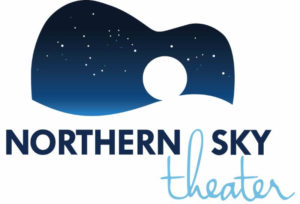Under the Newborn Stars: American Folklore Theatre
- Share
- Tweet
- Pin
- Share

“In our little corner of the woods, those ominous rumblings about the Death of American Musical Theatre are drowned out by the footfalls of 50,000 loyal fans strolling down the path in Fish Creek’s Peninsula State Park each year to laugh and cry with our merry players under the newborn stars.”
– Fred Alley, AFT co-founder
For nine months of the year, the amphitheatre nestled in the pines at the center of Fish Creek’s Peninsula State Park sits empty. The wind blows melodies heard only by the trees and the snow falls on empty wooden benches. If you happen upon it during the off-season, you will certainly stop to admire this scene, surprised to see a stage with trees vaulting out of its corner – seemingly in the middle of nowhere. You might mistakenly believe that you have discovered it.
But starting mid-June, the first of the season’s 50,000 patrons (impressively marking AFT as a major Midwest theatre destination) will pour into the park, stand in line with blankets and sweaters, and await the opening night of this oddball wonder called American Folklore Theatre. They will soak in the elements (sometimes quite literally as the theatre is completely outdoors) that make AFT the cult phenomena that it is, and they will return again the next night, and the next.
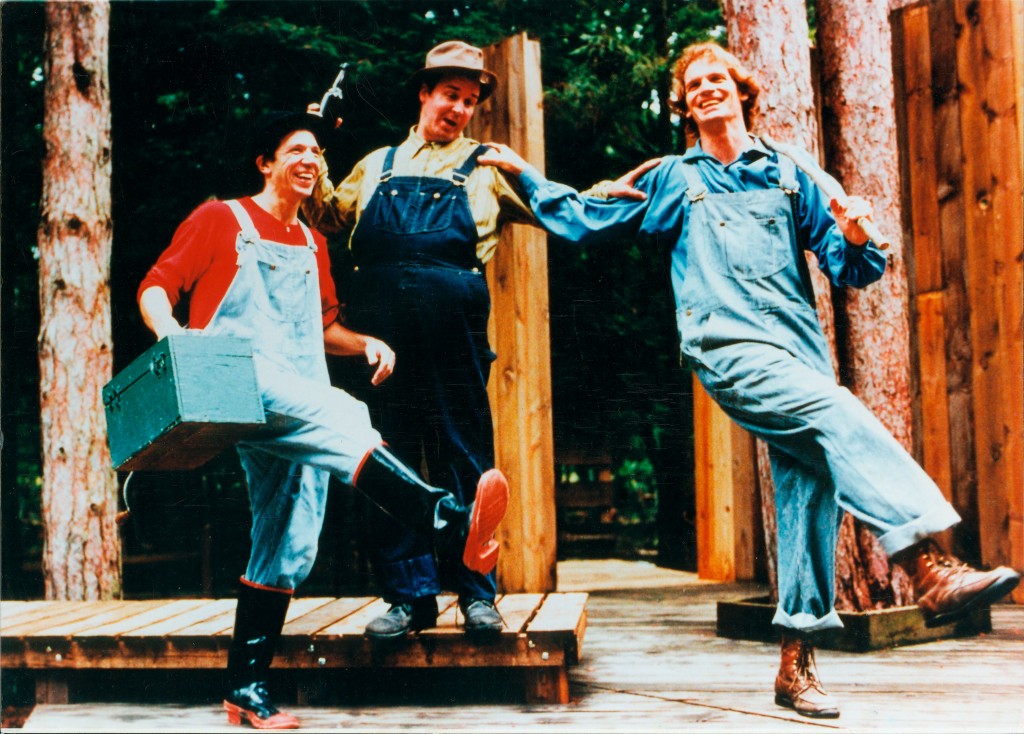
The majority are not newcomers. They have been here before, as children with their parents and now as parents with their own children, captivated by the sheer magic of sitting in the woods, shoulder-to-shoulder with strangers and listening to music float above the pines and over to the waters of Nicolet Bay. It’s high theatre: in comfortable clothes and mosquito spray. The adventure-packed plot often involves a fish and an accent, the state-of-the-art soundtrack comes from the three-piece professional pit band, and the special effects are most often the sun splashing reds and oranges over a Jim Maronek designed set. It’s a bit timeless, this place, and precisely why folks keep coming back for more.
Most patrons come simply for the love of good theatre. But many others – actors, playwrights, choreographers, composers, producers and theatre administrators alike – see AFT for the singular, specific, near impossibility that it is.
Devoted to producing professional (casting from New York, Chicago, Los Angeles, Minneapolis and Milwaukee), original (all shows are created for and debut on the AFT stage) musical theatre in rotating repertory (you can see three shows in one week’s time), this unassuming theatre is unlike any other in the country. Additionally, AFT has remained committed to their populist mission of providing professional, affordable theatre for all. With an average ticket price of about nine dollars, and a budget that has grown from $20,000 to three-quarters of a million, this makes AFT one of the most, if not the most, affordable professional theatres in the country.
“It’s risky, this ‘original musical theatre’ business,” says Laurie Flanigan, longtime AFT actor and author (AFT’s Loose Lips Sink Ships and See Jane Vote, as well as Hormel Girls, commissioned by and slated to open later this year at the History Theatre of Minneapolis). “Nothing is tried and true. It all starts with one idea, one page of dialogue, a note here and there, and lots and lots of work. It’s not at all like producing a show that’s been performed before, that audiences have test-driven. Luckily,” she says, laughing, “we’ve gotten pretty good at what we do, and most people love the shows.”
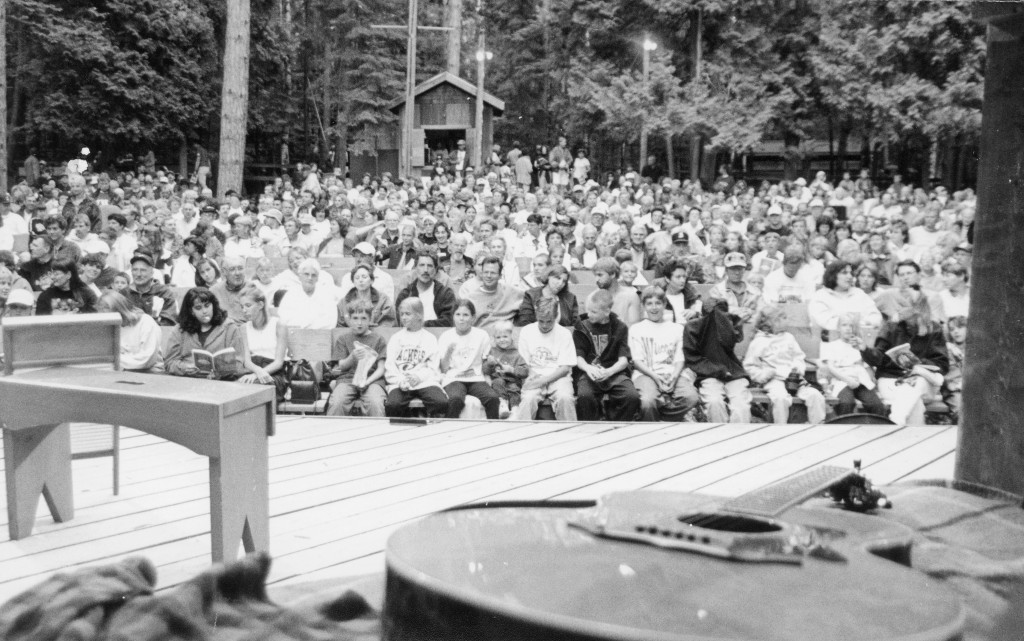
It’s been risky theatre here for more than three decades, and tracing AFT’s history is a bit like maneuvering the winding park roads to get to the theatre. Unofficially, AFT began when Dave Peterson, a University of Wisconsin professor, was camping in Peninsula State Park and hiked past a tiny stage used for naturalist presentations. He was captivated by the setting, and in the early 1970s, brought more than a dozen costumed singers and instrumentalists to play folk songs to crowds of campers, launching Heritage Ensemble. Actors Gerald Pelrine, Fred Alley, and Dr. Fred Heide joined the cast.
“I was completely captivated by the ensemble’s stirring melodies and the insight into the lives of folks long forgotten,” says Heide. “The authenticity of the material resonated with me…I got to sing glorious harmonies, pluck my Gibson guitar and breathe the pure piney air of the night.” The Heritage Ensemble, described as, “One part Peter, Paul and Mary; one part Broadway show tune; one part folksy Wisconsiana; and the rest pure cornball spunkiness,” played on the stage of Peninsula State Park for 20 years.
In 1990, Dave Peterson retired, and turned the theatre over to Pelrine, Alley and Heide. The trio changed the name to American Folklore Theatre and broke ties with the University of Wisconsin. Pelrine soon resigned, and AFT plucked Jeff Herbst (now Artistic Director) out of a Broadway show, contracted with Paul Sills (founder of Chicago’s Second City, and son of Viola Spolin, theatre legend), and James Kaplan (as Managing Director, later to be known as composer and collaborator on such hits as Guys On Ice, Lumberjacks in Love, Loose Lips Sink Ships, The Bachelors and others) came on board. M. Kaye Christman was hired as Managing Director, and an official Board of Directors was formed. The troupe turned from musical revues, the trademark of Heritage Ensemble, to more sophisticated book musicals, and to the “story theatre” genre introduced by Sills and made popular by Chicago’s Second City and Saturday Night Live.
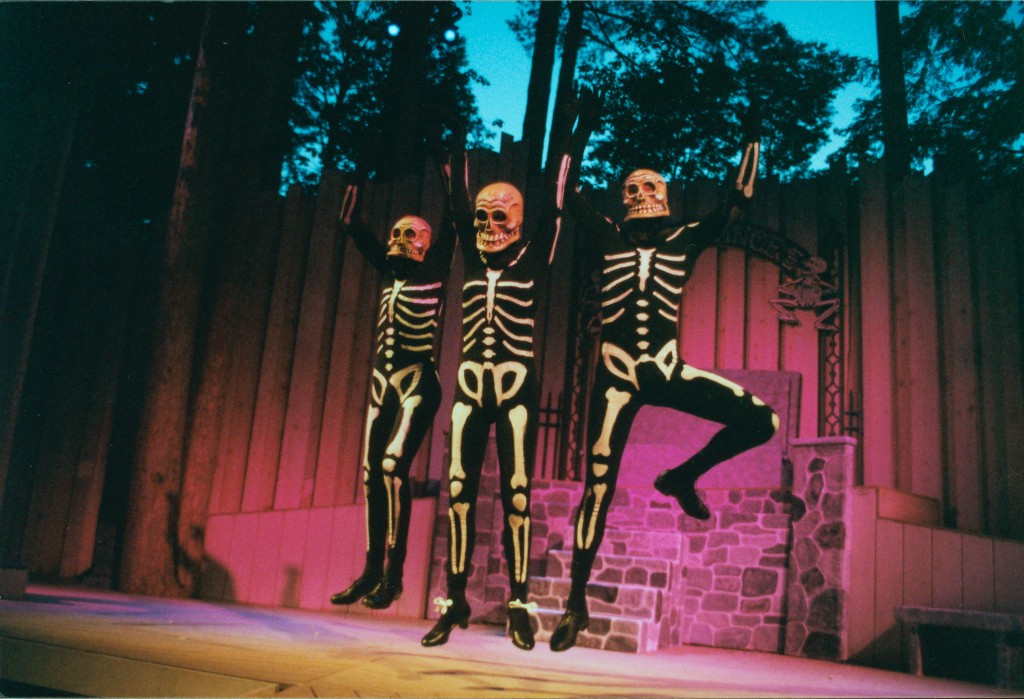
As the company grew, they continued to perform in the amphitheatre all summer, added a fall Town Hall Series, launched sister company Door Shakespeare, and continue to work with regional theatres throughout the country to produce and direct AFT shows. Two years ago, writer Dave Hudson and composer Paul Libman tumbled into AFT’s world and wrote Muskie Love, this season’s Cabin With a View, and this fall’s Main-Travelled Roads. In the past few years, AFT originals have played in Massachusetts, New York, Texas, Colorado, Oregon, Michigan, California and Wisconsin. To date, AFT has produced more than thirty original shows.
It is impossible to tell AFT’s story without stopping here to tell the story of Fred Alley. In true folkloric form, it’s rumored that Alley, then in his early twenties, had a ticket to fly to Los Angeles to seek fortune and fame in Hollywood when he was tracked down (via a loudspeaker, on a beach) and asked to spend the summer in Door County working for Heritage Ensemble. He agreed, and stayed for almost twenty years. A musician, prolific writer an all-around champion of the creative endeavor, Alley’s enthusiasm for music and storytelling was contagious. By his late-20s, he had written and recorded five solo albums, dozens of folk songs and, with composers James Kaplan and James Valcq, written hundreds of lyrics for songs performed in AFT shows. He was also an exceptional performer with an unforgettable voice and timing and wit that would bring the house down. He could sing, play guitar and even his less-than-polished dancing (“I’m like a bull in a china shop,” he said once, “ a very, very big bull in a very, very tiny china shop”) seemed only to make him more likeable, more attractive to his fans.
Largely due to Alley’s personal charisma and professional standards, actors and audiences kept coming back for more. And largely due to his marketing and business efforts, the theatre (whose office was officially, and for years, the trunk of Alley’s car) grew to become the business that it is today. In 1991, after nine years of performing on the stage, Alley began writing book musicals, the first being Tongue N’ Cheek. He went on to pen Lumberjacks in Love, The Bachelors, Guys on Ice, and other hits. On May 1, 2001, Alley died of a heart attack while jogging near his Door County farm. He was 38 years old.
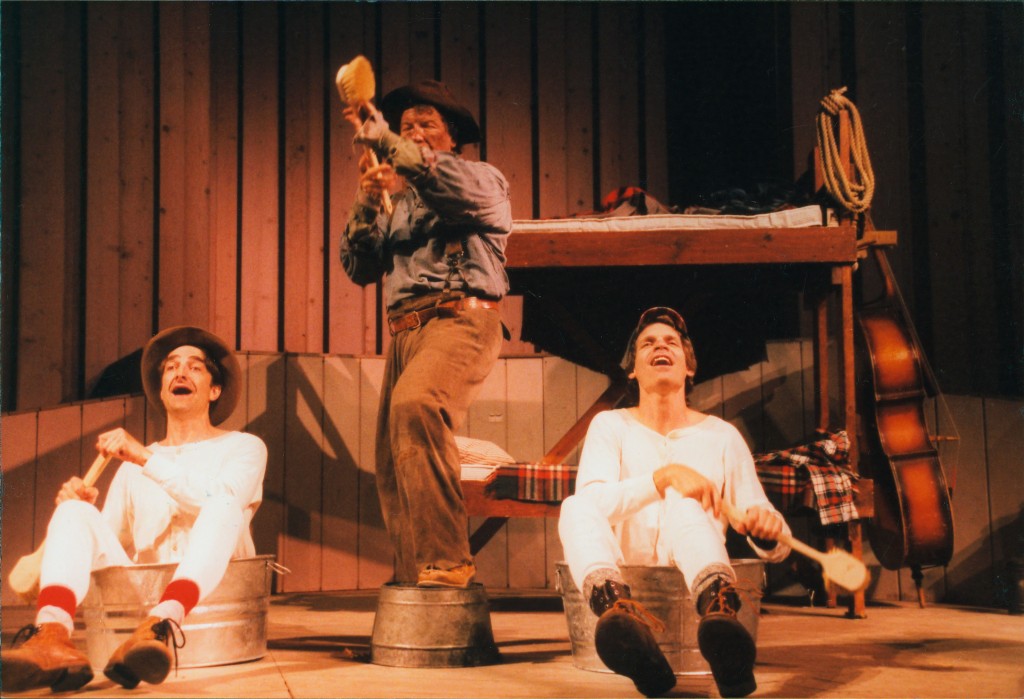
What Alley, Heide, Herbst, Kaplan and a handful of core AFTers (Laurie Flanigan, Lee Becker, Jon Hegge, Suzanne Graf, Eric Lewis, Chris Irwin, Karen Mal, Doug Mancheski, Dave Alley, Neen Rock, Michael Christman, Claudia Russell, Scott Wakefield and others) have created is special indeed, but ask any of them what it is that makes AFT a cut above other professional theatres and you get the same answers: the caliber of the audience and the caliber of the artists.
AFT veteran Doug Mancheski, who was working with a New York theatre company, Blue Circle Theatre, had migrated to Door County for a summer to study with Paul Sills. When the summer ended, Mancheski preferred to stay in Wisconsin and has been an AFT favorite since.
“The audiences here are truly the most generous of any I have performed for. They are incredibly loyal. What makes it unique is the wide age span, from two to 102. That’s really amazing, since most theatre attracts a more middle-aged crowd. Plus, the shows are just plain fun. They are wholesome without being hokey. They present a view of life that we would all like to be a part of, one full of innocence and love. And they allow us to fulfill our great need to laugh.”
“I still remember the impact it had on me the first summer I performed,” says long-time AFT actor Lee Becker. “Parents would shake my hand and sincerely thank me for the work we do. I have always felt good that the work that I do makes people laugh, and I have always felt that anyone who makes people laugh is giving them a gift. But [performing at AFT] has made me feel like what I do helps strengthen the American family. The connection to the community is what gives AFT its vitality and purpose. Fred [Alley] knew that and was a dedicated champion of that connection.”
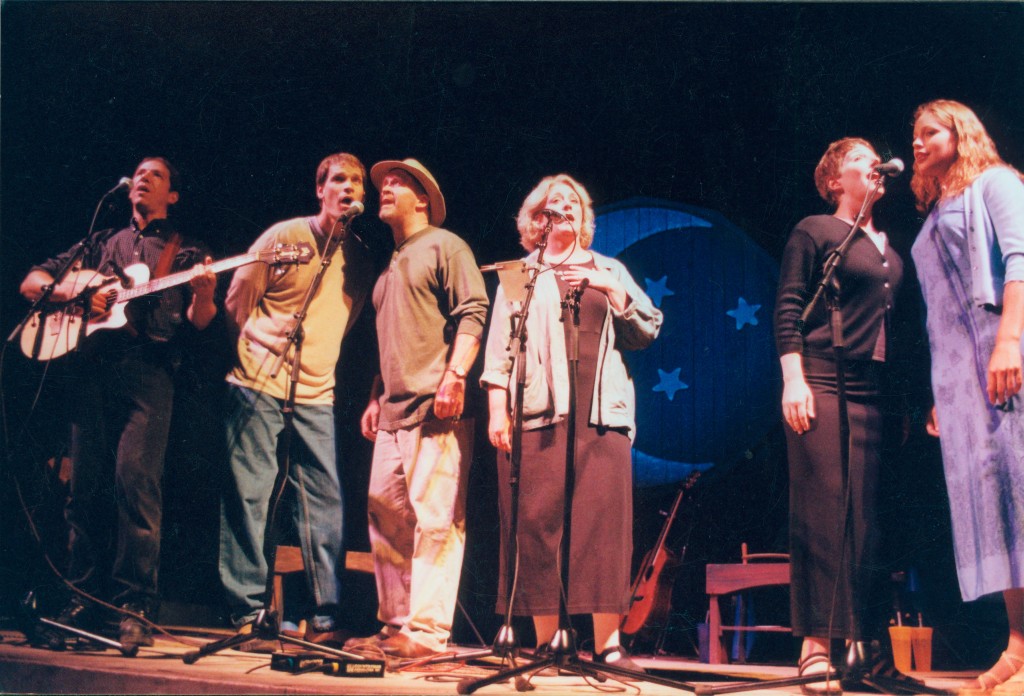
“AFT has been my artistic home for many years,” says Flanigan. “I’ve worked as an actor and musician, and with the encouragement of Alley, Herbst and Kaplan, have become a writer. It’s corny to say that AFT is a family, but it is, in a sense, a family of talented people working to bring out the best, artistically and personally, in one another. Working for AFT is a long-term relationship between the company members, but also with our audiences who are like no other audience in the world. So generous. So loyal. So happy to be here.”
It’s easy to talk up this theatre, especially if you’re a longtime fan, and even easier to be a bit smug when the rest of the theatre world (read: NYC) sits up and takes notice. The Richard Rogers Award, endowed by the late Richard Rogers, is given annually by a selection committee composed of the who’s who of American Musical Theatre (Steven Sondheim chairs the committee). In 2001, shortly after Alley’s death, Alley and composer James Valcq won this prestigious award for The Spitfire Grill. In 2005, composer Paul Libman and author and lyricist Dave Hudson were awarded the 2005 Richard Roger’s Award for Dust and Dreams: Celebrating Sandburg (formerly titled Bringers). This year, Libman and Hudson were again (in an unprecedented move) awarded a second Richard Rogers Award for Main-Travelled Roads, an intimate new musical based on the writings of Wisconsin native Hamlin Garlin, and slated to debut this fall in the AFT Town Hall Series. Historically and nationwide, there have been 61 Richard Rogers Awards granted. Do the math and you realize that five percent of these awards can be tied directly to AFT.
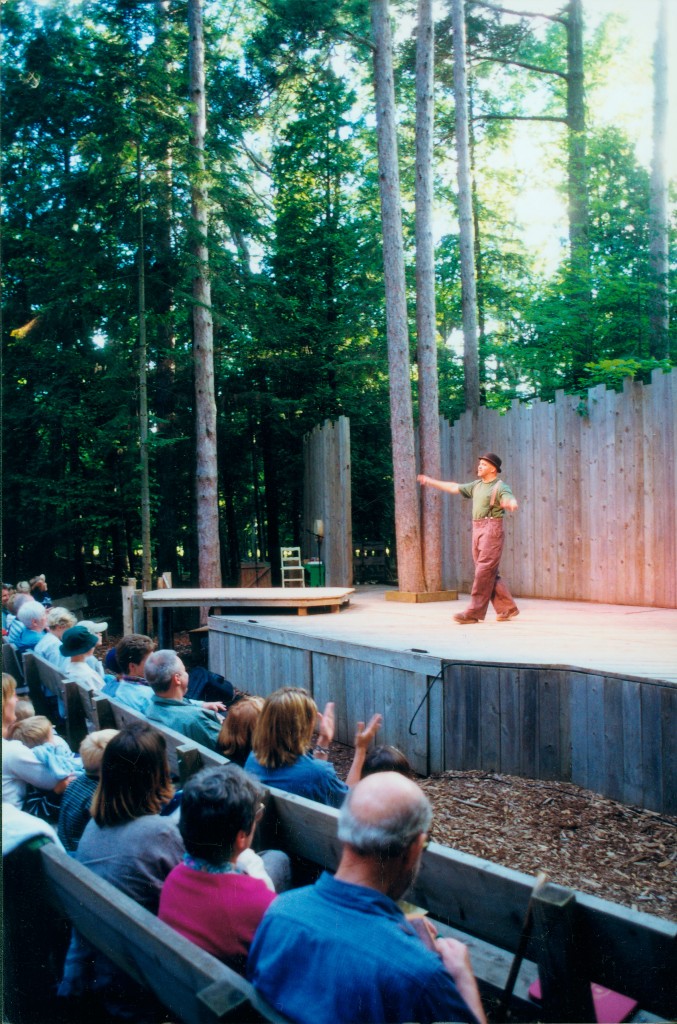
“It’s over a thousand miles from Fish Creek, Wisconsin to Broadway,” says Dave Hudson. “But the distance seems to shrink a little each day as AFT, the little theatre in the woods, steadily continues on its mission to nurture and develop the most wonderful art form – the American Musical.”
The theatre’s success is no surprise to Fred Heide. “[Fred Alley] and I both recognized that this modest little theatre in the woods was something that really mattered to people. Somehow [we’ve been able] to write shows that appeal to kids in short pants and Yale professors. And we’ve touched their souls in the bargain.”
The summer season is here. See you under the stars.
For more information, call (920) 854-6117 or visit www.fokloretheatre.com.

